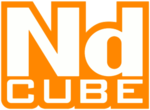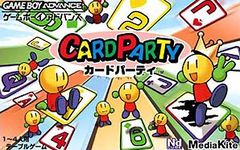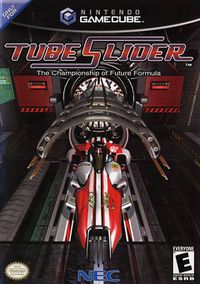| Site Notice |
|---|
|
We have a limited coverage policy. Please check our coverage page to see which articles are allowed. |
Difference between revisions of "Nintendo Cube"
Torchickens (talk | contribs) (→Games) |
Torchickens (talk | contribs) (→Non-Nintendo published works) |
||
| Line 154: | Line 154: | ||
The game features support for four players using a [[Game Boy Advance Game Link Cable]]. | The game features support for four players using a [[Game Boy Advance Game Link Cable]]. | ||
{{stub|type=section}} | {{stub|type=section}} | ||
| − | |||
| − | |||
====Technical details==== | ====Technical details==== | ||
| Line 163: | Line 161: | ||
|input=Game Boy Advance | |input=Game Boy Advance | ||
}} | }} | ||
| + | |||
| + | |||
| + | ===Tube Slider: The Championship of Future Formula=== | ||
{{Game infobox | {{Game infobox | ||
Revision as of 15:20, 29 April 2019
| Nd Cube | ||||||||||
|---|---|---|---|---|---|---|---|---|---|---|
| ||||||||||
| ||||||||||
|
Nd Cube Co., Ltd is a Nintendo research and development subsidiary, founded in 2000. They are currently known for developing many of the later entries in the Mario Party series. The company is currently headed by Hidetoshi Endo, the former president of Hudson Soft. The "Nd" comes from the original founders of the company, Nintendo and Dentsu (the capital "N" indicating Nintendo's majority ownership).
Contents
History
In 2000, Nintendo and Dentsu founded Nd Cube as part of a joint venture, Nintendo owning 78% of the company's shares while Dentsu owned 13.3% of shares, the other 8.9% being undecided.
By April 2006, many of Nd Cube's employees had moved on to join other developers, primarily Nintendo and Square Enix, after Nintendo rejected the company's experimental projects. In that time, they posted job ads for Wii and Nintendo DS development. At a later point, many former employees from Hudson Soft, including core Mario Party staff and former president Hidetoshi Endo, joined Nd Cube.
In August 2010, Nintendo bought all of Dentsu's shares, becoming the sole owner with 98% of the company's shares.
Games
| Game | Year | Console | Publisher | Description |
|---|---|---|---|---|
| F-Zero: Maximum Velocity | 2001 | Game Boy Advance | Nintendo | F-Zero series racing game |
| Dokodemo Taikyoku: Yakuman Advance | 2001 | Game Boy Advance | Nintendo | Mahjong game |
| Pool Edge | 2002 | Nintendo Gamecube | Media Kite | Pool game |
| Card Party | 2002 | Game Boy Advance | Media Kite | Traditional card game compilation title |
| Tube Slider: The Championship of Future Formula | 2003 | Nintendo Gamecube | NEC Interchannel | Futuristic racing game |
| Wii Party | 2010 | Wii | Nintendo | Minigame focused game similar to Mario Party series |
| Mario Party 9 | 2012 | Wii | Nintendo | Mario Party series game |
| Wii Party U | 2013 | Wii U | Nintendo | Wii Party series game |
| Mario Party: Island Tour | 2013 | Nintendo 3DS | Nintendo | Mario Party series game |
| Mario Party 10 | 2015 | Wii U | Nintendo | Mario Party series game |
| Animal Crossing: amiibo Festival | 2015 | Wii U | Nintendo | Animal Crossing series spin-off loosely similar to Mario Party in terms of sharing board-game action and minigames |
| Mario Party: Star Rush | 2016 | Nintendo 3DS | Nintendo | Mario Party series game |
| Mario Party: The Top 100 | 2017 | Nintendo 3DS | Nintendo | Mario Party series game; a compilation of the 'top' minigames from past entries in the series. |
| Animal Crossing: Pocket Camp[1] | 2017 | iOS / Android | Nintendo | Mobile free-to-start Animal Crossing title |
| Super Mario Party | 2018 | Nintendo Switch | Nintendo | Mario Party series game |
Non-Nintendo published works
Card Party
| Card Party | ||||||||||||||
| カードパーティ | ||||||||||||||
| ||||||||||||||
| ||||||||||||||
| ||||||||||||||
|
Gameplay
Card Party features twelve different types of card games. These include the following games:
- Concentration (しんけいすいじゃく)
- Old maid (ババぬき, babanuki)
- Count (ダウト)
- Cheat (ダウト)
- Dobon (ドボン)
- Page one (ページワン)
- Daifugō (大富豪)
- Seven bridge (セブンブリッジ)
- Sevens (7ならべ)
- "29"
- "51"
- Blackjack (ブラックジャック)
- Poker (ポーカー).[2]
The game features support for four players using a Game Boy Advance Game Link Cable.
| This section is a stub. You can help NintendoWiki by expanding it. |
Technical details
|
Tube Slider: The Championship of Future Formula
| Tube Slider: The Championship of Future Formula | ||||||||||||||
| ||||||||||||||
| ||||||||||||||
| ||||||||||||||
|
Tube Slider: The Championship of Future Formula is a futuristic racing game released for the Nintendo GameCube exclusively in North America in 2003. The game's main feature, as indicated in its title, is that all racetracks are set in oversized transparent tubes. Though developed by Nintendo subsidiary Nd Cube, the game was published by NEC, and specifically was the first title published by subsidiary NEC Interchannel.[3]
Tube Slider was the last game developed by the original incarnation of Nd Cube. Following its release, most of Nd Cube's staff would leave the company and Nd Cube would not release another game until 2010, after an influx of former Hudson Soft employees.
Blurb
LIMITLESS VELOCITY
Get your adrenaline fix as you race at incredible speeds in hover vehicles that slide through gravity-defying racecources at over thousand miles per hour. The future of championship formula racing is faster, sleeker, and more dangerous - you may be able to avoid hitting the walls, but can you defy your opponent's power-siphoning Lock-On beams? You may be able to finish a race... but can you win it?
- Select from a large variety of futuristic racing vehicles, each with its own speed and handling characteristics!
- Choose Competition Mode to race against aggressive A.I. racers, or up to four players can compete to win the ultimate future formula title!
- Race on fantastic futuristic courses that are full of challenging twists and turns.
- Training courses and an in-game tutorial help you master the maneuvers required to survive the speed-intensive challenges.
- Speed enhancers such as Turbos and Boosters help you break all racing performance records!
Can you handle the power?
Gameplay
Tube Slider follows a conventional racing game structure. The player must first select from among eight vehicles with differentiated stats and handling models and participate in various racing championships. All of Tube Slider's tracks are inside transparent tubes.
Before each race, the player can select if they want their vehicle to be equipped with a "turbo" or a "booster". The turbo provides a powerful one-time burst of speed while the booster is a less powerful but more flexible speed enhancer that can be feathered. Boost energy automatically regenerates and can also be collected by siphoning other competitor's reserves, or by collecting Velocity Pick-ups scattered around the tracks. Blue items add to the player’s energy reserves, yellow items provides an immediate burst of speed like the turbo and rare red items accelerate the vehicle to a far greater degree.
Unlike most futuristic racing games, Tube Slider does not feature combat, but instead features a "Lock-On" system: by moving the vehicle directly behind an opponent’s craft, competitors can siphon away boost energy and add it to their own reserve. However, if the attacked craft boosts before the lock-on attempt is completed, they will steal energy from the attacking craft.
The main gameplay mode of Tube Slider is Grand Prix mode, which task the player to compete through three racing tournaments alone or split-screen with one other player. Completing the final regular tournament unlocks Maximum mode, which features the same tournaments played at greater speed and difficulty, and the Tryal Road, a one-time race against a powerful boss vehicle named Spyder. Completing the Tryal Road in Normal mode unlocks an alternate model for the selected vehicle while completing it in Maximum mode unlocks Spyder itself. Other modes include Time Attack, Free Run, Course Pratice (which has the player collect orbs in some of the regular tracks and get graded on their speed and number of orbs collected), and Tutorial, a collection of videos explaining various aspects of the game.
Development
Tube Slider was initially announced at the end of January 2003, and slated for release in February.[3][4] However, the game's release would later be delayed to April. The game's vehicle and environment designs were done by Japanese animation studio Studio 4°C.[5]
Reception
| Aggregate scores | |
|---|---|
| Metacritic | 62 |
| GameRankings | 66.65% |
| Reviews | |
| IGN | 6.1/10 |
| Nintendo Power | 5.8/10 |
| GameSpot | 5.6/10 |
Reviews for the game were generally middling upon release, with many critics comparing the game unfavorably to other similar racing games, most notably the F-Zero series. IGN's Matt Casamassina gave the game a 6.1 out of 10, calling the gameplay "shallow", the increasing difficulty "unbalanced", and overall calling the game "[...]an above average racer. But it's not in the same league as more ambitions entries like XGRA and F-Zero." Ryan Davis of GameSpot rated Tube Slider a 5.6 out of 10, calling the game "a generally uninteresting futuristic racer that doesn't do anything that hasn't already been done, and done better, by previous futuristic racers."
Technical details
|
External links
References
- ↑ Animal Crossing: Pocket Camp was developed by ND Cube. GoNintendo (February 25, 2018). Retrieved February 25, 2018.
- ↑ The back of a Card Party box
- ↑ 3.0 3.1 NEC Back in Games Business. IGN (January 31, 2003). Retrieved June 3, 2017.
- ↑ Tube Slider. IGN (January 31, 2003. Retrieved June 3, 2017.
- ↑ Tube Slider on KojiMorimoto.net. Retrieved September 25, 2016.
External links
References
Nintendo Cube on other NIWA Wikis: | ||||
|---|---|---|---|---|
|


